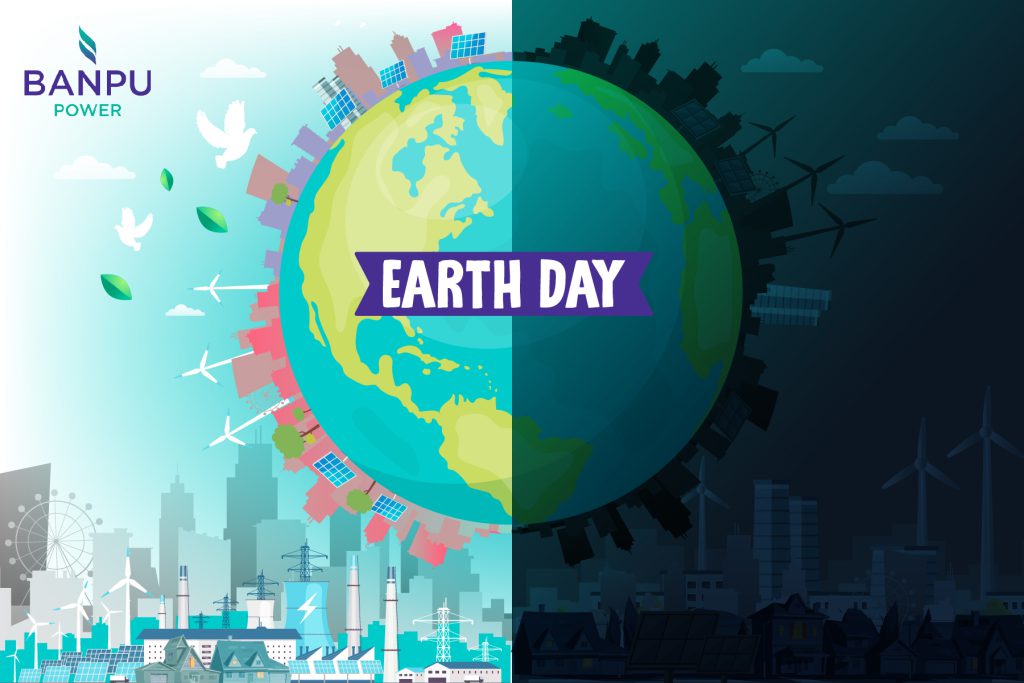How are the Missions to Address Climate Change, Energy Sustainability, and the Biggest Blackouts in History all Related?

Climate change refers to the rise in global temperatures and climate volatility, which inevitably impose changes in people’s lifestyles that may affect the environmental impacts. In addition, uncertainties due to the COVID-19 pandemic and the tensions in Europe are contributing to volatility in the price of energy resources such as oil, natural gas, and coal, which collectively impact electricity generation capacity around the world.
On the occasion of Earth Day, which is celebrated annually on 22 April, the power generation industry, which plays an integral role in powering the world and driving its future, recognizes that the key to success is sustainable co-existence and actively taking part in safeguarding the planet, and that all power producers must focus on contributing to the balanced management of electricity generation and utilization.
Banpu Power Public Company Limited, or BPP, a leading power-generating company with a balanced portfolio from both thermal and renewable power businesses across the Asia-Pacific region, recognizes the challenges posed by climate change together with the importance of energy security and the need to efficiently use natural resources and electricity ensuring their maximum benefits. The key factors necessary for effective power generation and management are underscored when looking at the two largest power outages of all time.
The blackout in the Indian state of Assam*, which occurred in July 2012, was one of the largest in history highlighting the country’s inability to provide adequate electricity to meet rising demand towards the peak summer period. As a result, more than 600 million Indians lived without power for up to two days, plunging the affected areas into darkness – and during the extreme summer heat. People were not able to use of cooling equipment like air conditioners and fans, millions were left stranded at train stations, while the blackout extended to telecommunications. Another massive power outage occurred in the United States in Texas* in February 2021, when the state experienced severe winter storms with average temperatures reaching -18°C over several days. The wind turbines connected to the electric grid froze in the severely cold conditions and the state’s grid were also impacted. The blackout left people without electricity with 60 people deaths from hypothermia. The state faced food and drinking water shortages, forcing people to stockpile supplies and necessities.
These two incidents reflect the impact due to the lack of grid resilience which resulted in extended blackouts and disruptions to power availability, just when people needed it the most. It also shows the need for a strong security in energy supply and generation that adequately meets people’s demands addressing their safety and security, allowing them to go about their daily lives, especially in the event of disruptions or natural disasters.
Practically speaking, technologies used to generate electricity from renewable energy currently have some restrictions in terms of the reliability, electricity consumption and demand, as well as cost, which can vary at different times and periods. It is, therefore, important to establish a balance among different energy sources to reduce risks when generating and supplying electricity ensuring stability and an uninterrupted flow. In addition, there is a need to apply supportive tools and equipment to deal with climate volatility for certain types of power plants. Risk management in power generation is another critical component to dealing with external factors or crises such as earthquakes, tsunamis, or even cybercrimes, and must be prioritized by the power producers to prevent and avoid blackouts such as the two cases mentioned above.
BPP focuses on effective portfolio management in its power generation and distribution business in line with energy sustainability through the ARE principle, which consists of three core pillars: affordable energy supply (Affordable) where people have access to energy despite different government support policies being in place across different areas; constant energy supply (Reliable) that adequately meets demand without interruptions avoiding power shortages or outages; and sustainable energy that supports societies, communities, and the environment (Eco-friendly), which includes power generation from renewable energy sources and the adoption of High Efficiency, Low Emissions (HELE) technology to increase the efficiency of thermal power plants. In addition, BPP continues to expand its business portfolio based on the ‘Balancing Triangle’ (Economic – Environment – Security of Supply) across a range of areas to achieve economic value, security and environmentally friendly electricity supply that creates significant value supporting livelihoods and driving sustainability – and which responds to energy needs based on contexts and regulations that vary in each country.
BPP continues to demonstrate its commitment to creating steady and sustainable growth incorporating environmental, social and governance (ESG) principles, and applying advanced technologies in power generation to reduce carbon dioxide emissions (decarbonization). This is a significant mission that BPP, as a power producer, aims to accomplish to be a driving force that improves the economy, society, and quality of life while delivering a sustainable world for future generations.
*References
– https://www.theblackoutreport.co.uk/2020/12/07/11-biggest-blackouts/
– https://www.bbc.com/news/world-56085733
– https://edition.cnn.com/2021/02/18/weather/winter-storm-weather-thursday
###
About Banpu Power
Banpu Power Public Company Limited is a leader in power generation and distribution in the Asia-Pacific, including Thailand, Lao PDR, China, Japan, Vietnam, Australia, and the United States, with a position of We ARE (Affordable, Reliable, and Eco-friendly) Power for a Sustainable World approach. For more than two decades, BPP has been committed to operational excellence in achieving efficient power generation while deploying high-efficiency, low-emissions (HELE) technologies that are safe and environmentally sound in accordance with its Greener & Smarter strategy. The Company is working towards reaching a total equity-based power generation capacity of 5,300 MWe by 2025.



